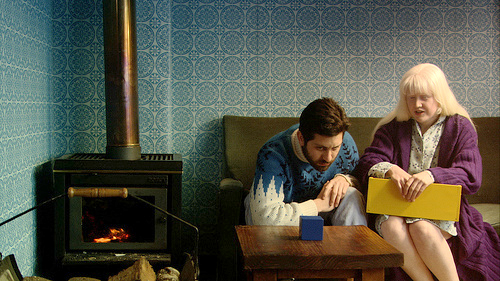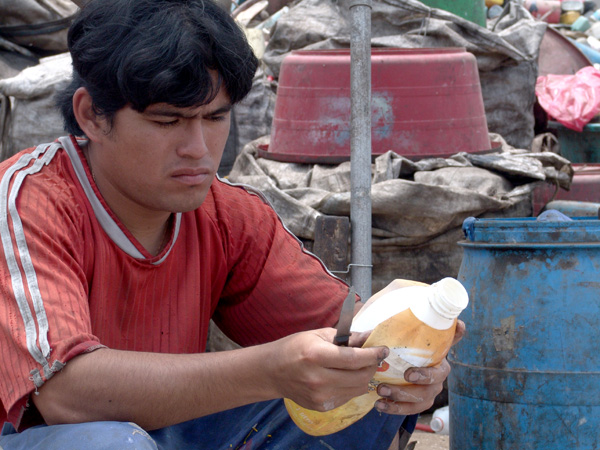|
Reviews of Recent Independent, Foreign, & Documentary Films in Theaters and DVD/Home Video

Latinbeat Film
Festival In the dour opening moments of Perpetuum Mobile, an elderly woman blows her nose and slowly shuffles about her apartment, alone. Dusting her living room, she sings to herself “I don’t have a single friend to console me”—her spirits are unlikely to lift. After this slowing-going sequence (oh, no, not another neo-neo-realism film), stay put. What follows is an incisive and starkly satiric portrayal of a mother and her grown son living in a screw-or-be-screwed Mexico City. If the speed of life is perpetual motion, as the off-putting title implies, then the result’s like a dog chasing its own tail. Sleepy-eyed, rail-thin, 24-year-old Gabino is the hangdog Laurel to his mother’s heavyset, put-upon Hardy. They are estranged from each other even though they live together in close quarters. He never listens to her, she feels neglected, he resists her attempts to change him, and so on. As is to be expected, there are too-true-to-life scenes of characters hanging out, waiting, especially in between the sticky situations Gabino encounters as a furniture mover, but many of the elongated single-take scenes build to a squirm-producing climax. In one such intimate moment, which is almost embarrassing to watch, the mother fawns over her pet terrier on her bed (“Who loves you like no one else in the world?”), the film’s one example of family bonding. After making the festival circuit over the last year, this Mexican indie is one of 16 films featured in the 13th annual Latinbeat Film Festival to finally arrive in New York. In another minimalist, observational film, the low-key Chilean comedy Optical Illusions, character development wins over quirkiness, which includes a symbolic circumcision—not seen, by the way. Director Cristián Jiménez and Perpetuum’s Nicolás Pereda are discoveries who progressively demand and receive your attention. Manuela wants to go under the knife to get bigger breasts, hoping to change her luck with men. Her brother Rafa longs for the beautiful, rich shoplifter he spies on through the closed-circuit cameras at his mall security post. (His advice to his sister to face it, that they’re both “kinda dark skinned, kinda skinny” falls flat.) Thrown into the mix is formerly blind Juan. Because of a botched surgery, he can now see, but barely, only enough to know that the world is ugly. Jiménez puts his mid-size ensemble through the wringer, delivering the simple truth, “It’s better to leave things the way there are” with sad resignation. Those who thought that the award-winning The Milk of Sorrow (seen at last year’s edition) sagged under the weight of its symbolism and metaphorical Garden of Eden will find that the stripped-down, sparse Paradise, also from Peru, brings viewers down to street level. In a sprawling, arid shantytown with no running water, only one sickly tree miraculously survives.
Among the other selections previewed, Gordon Gekko returns in the form of an Argentinean tycoon in Marcelo Piñeyro’s glossy thriller Thursday Widows, based on a best-seller that took its cues from Argentina’s 2001 economic and political meltdown. Take the darker, sinister elements of Desperate Housewives, up the real estate value, subtract the number of husbands (three wind up dead in the first reel), and play it straight. Carlos
Hagerman’s Back to Life
began as a documentary about a shark hunt and then morphed into a
heartfelt, all-in-the-family tribute to a local Acapulco legend, macho
ladies man and diver/fisherman Hilario Martínez Valdívia. But it’s also
about the Mexicanization of his wife—the tall, redheaded New York model
Robyn Sydney, nicknamed the Giraffe—and her freckle-faced, towheaded son
from her first marriage, American-born John Grillo, also the film’s
cinematographer. Both appear on camera speaking only Spanish in an
example of American immigration in reverse.
Kent Turner
|


